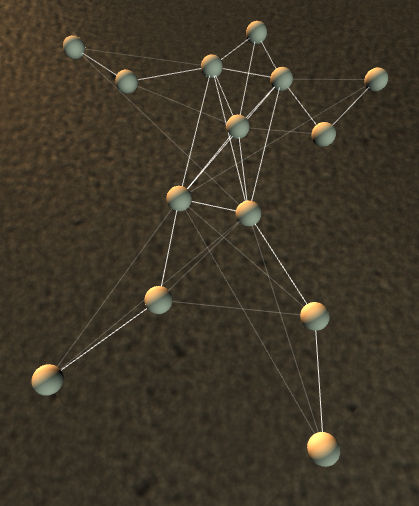The ranks of open source games added to another 4 cool copies

An epic swing march initiated by Wolfire - the action of selling 6 popular indie games “buy for how much you want” - The Humble Indie Bundle - World of Goo, Aquaria, Gish, Lugaru, Penumbra and Samorost 2 - ended about 2 hours ago and I had such an ending, which many have dreamed of for several years, but no one really believed in such a thing.
During the week of work, more than a million US dollars were collected - and 2 hours ago, as a token of appreciation to the community that supported them, the Wolfire, Bit Blot, Cryptic Sea and Frictional Games development teams announced that from now on four games out of six - Aquaria, Gish, Lugaru and Penumbra - will be released in source code under an open source license.
The source code for Lugaru HD is already uploaded , the remaining 3 games should follow the example of a few days. Lugaru is laid out as a Mercurial repository on Icculus.org - the code is compiled using ordinary Makefiles (and gcc), like the XCode project and like the Microsoft Visual Studio project. License - GPL v2.
')
Phew - and now, having thrown off the pathos of pathos and euphoria, let us think, first, what it gives to the community, and second, what are the pitfalls here, if there is. So, indisputable (or slightly controversial) advantages:
The community has received (well, has not yet received, but will receive) ready-made, high-quality, proven by the attention of the public and even a little bit of time engines. The number of mods (and any partial conversions) of the same Lugaru, even without source codes - only due to the substitution of maps, scenarios and models - is in the tens and hundreds. On the Wolfire wiki-page about Lugaru mods, you can familiarize yourself with the most interesting, high-grade and high-quality ones - and what happens here - you can imagine a flight of fancy.
The immortal phrase “Code rots. Game code rots even faster, which is attributed to almost a dozen famous people - from John Carmack from iD software to Scott Miller from 3D Realms - is right more than ever. The community received a fresh , up-to-date code of the engines, and not the engine of the “before last generation”, as it happens in the case of the release of a code by companies such as iD software (they are honored and praised, however, even for this):
- Lugaru - an interesting three-dimensional engine with high-quality and very fast ragdoll physics - by and large - this is what was a logical modern continuation of such games as Mortal Kombat and Tekken, incorporating elements of Max Payne.
- Aquaria is a high-quality, fast and feature-rich engine of a two-dimensional platform-like game, with a mass of modern bells and whistles like OpenGL particle systems.
- Gish is an engine of two-dimensional physics, including physics of amorphous bodies - after all, the main character of the game is a bouncy and sticky tar ball, which can take any form.
- Penumbra - here, due to the specifics of the genre, of course, the plot and horror content of the game are in the foreground - but if you ignore this, the Penumbra is also a three-dimensional engine, with a non-trivial approach to character management, with very decent physics, with fast, qualitative and unconventional miscalculation of light and shade, etc. Who knows - maybe we will see the reincarnation of Alone in the Dark on it?
What we lacked in these games? Multiplayer in Lugaru and Aquaria? New tricks, weapons, enemies, a couple of thousand new cards? You can roll up your sleeves and do. All 4 released games are quite modding enough - you can only guess what fantasy comes to when interested people get the source code. Want to transfer this to other platforms? iPhone OS, BSD, Solaris, Symbian, Android, MeeGo - now all this can be done easily.
This is, for example, the ragdoll-model Lugaru from the inside:

But besides the advantages, there are also slippery questions that not everyone paid attention to. Judging by the promises in the blog, all games will be divided into “free” engine and “non-free” (or “not quite free”) content. In the case of Lugaru, the content from the demo version (artwork, maps, models, textures) is uploaded to a common repository under a vague license “can be downloaded and used for personal non-commercial use, cannot be sold” - derivative works from such content are also most likely prohibited. Full content from the full version remains proprietary and paid - i.e. thus, those who bought these games were bought for a reason - the only way they can be played legally. The remaining games are likely to follow the example of Lugaru.
In principle, this is correct - it would be rather foolish to equate those who bought and paid money with those who did nothing to help the project - this is, after all, not abandonware. But, on the other hand, it puts a cross on the beautiful idea of the full availability of these games for free from operating system repositories and the possibility to put everything in one command like
apt-get install lugaru . At best, there will be a more complicated procedure: “put the engine separately, put the content here, launch it”.PS The financial results of the campaign are also very interesting: this action, without a doubt, has become the largest and most successful event of this kind. I hope that a little later I will cover on Habré and topics like "how to earn a million dollars in a week" and "users of which operating system are the most generous."
PPS The opportunity to buy extended for another 3 days - for those who did not have time, but still wants.
Source: https://habr.com/ru/post/93317/
All Articles